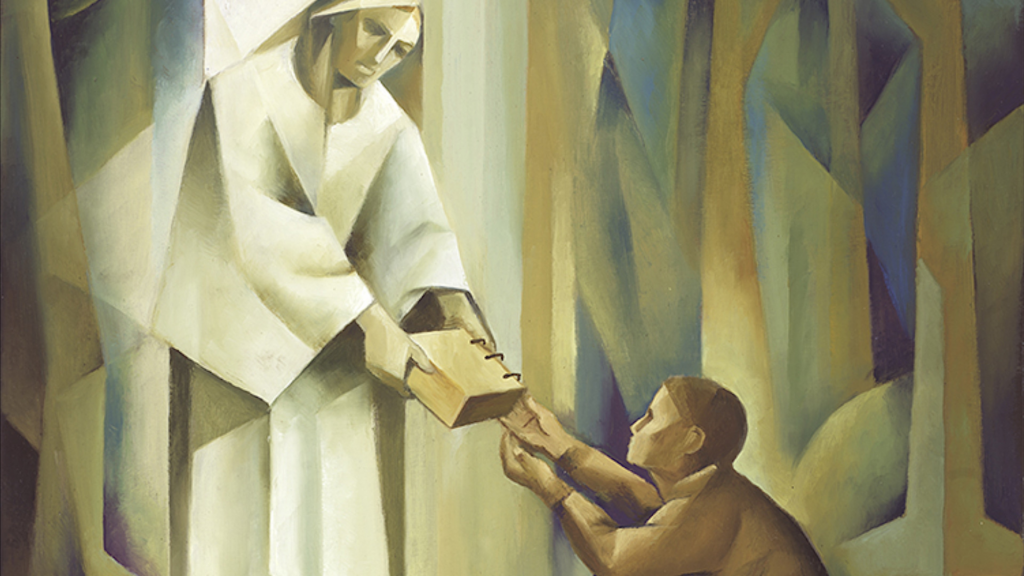Joseph Smith is a name that echoes down the centuries as the founder of the Church of Jesus Christ of Latter-day Saints, better known as the Mormon Church. His life and legacy are complex, involving religious, political and social aspects that continue to arouse interest and debate to this day.
The life of Joseph Smith
Joseph Smith's life was marked by a series of events and experiences that shaped not only his own personal journey, but also the religious history of the United States and beyond. Let's explore some key aspects of his life in more detail:
Youth and First Religious Experiences
Joseph Smith was born into a rural family in Vermont in 1805. His childhood was marked by economic hardship, frequent migrations and a continuous search for stability. The Smith family was deeply religious and Joseph was exposed to a variety of Protestant traditions during his youth.
At the age of 14, Joseph claimed to have had a divine vision, in which God and Jesus Christ appeared to him and instructed him not to join any of the existing churches, as they were all in error. This seminal experience was the starting point for his spiritual journey and eventually led him to found a new religion.

Translation of the Book of Mormon
After his initial vision, Joseph Smith claimed to have been visited by an angel named Moroni, who instructed him to find and translate a set of gold plates buried in a nearby hill. These plates, which he claimed were written by ancient American prophets, became the Book of Mormon, which is considered by members of the Mormon Church to be sacred scripture complementary to the Bible.
The translation of the Book of Mormon took up a large part of Smith's life and was a complex and controversial process. He used divinatory instruments, known as the "Seer Stones" or "Urim and Thummim", to translate the text from the gold plates. This translation was carried out with the help of several scribes, including his close friend Oliver Cowdery.
Founding of the Mormon Church
In 1830, Joseph Smith officially founded the Church of Jesus Christ of Latter-day Saints in Fayette, New York. The new religion attracted a significant number of followers, especially in the northeastern region of the United States. Smith played a central role in the leadership and organization of the church, revealing new scriptures, establishing doctrines and ordaining religious leaders.
The church grew rapidly, but also faced persecution and hostility due to its beliefs and practices considered heterodox by the society of the time. Smith and other Mormon leaders were often the target of violence and discrimination, which led to several migrations in search of refuge and religious freedom.
Polygamy and Other Doctrines
In addition to translating the Book of Mormon and founding the church, Joseph Smith revealed a series of doctrines and practices that challenged the religious and social norms of the time. One of the most controversial was the doctrine of polygamy, which Smith began to receive revelations about in the 1830s and practiced secretly until the 1840s.
Polygamy was a difficult practice to reconcile with the social and legal norms of the time and caused divisions within the Mormon community. Although Smith claimed that polygamy was a restoration of an ancient biblical principle, its practice was a source of controversy and discontent both inside and outside the church.
In addition to polygamy, Smith taught a number of other distinct doctrines, including the belief in the existence of multiple inhabited worlds, the idea of a restored priesthood and the practice of baptism for the dead. These doctrines were fundamental to the church's identity and growth in the 19th century and remain central aspects of Mormon theology to this day.
Death and Legacy
Joseph Smith's life came to a tragic end in 1844, when he was killed by an angry mob while being held in a prison in Carthage, Illinois. His untimely death left a leadership vacuum in the church and triggered a series of conflicts and disputes over his succession.
Despite his early death, Joseph Smith's legacy as a prophet and religious leader continues to resonate throughout the centuries. His influence is evident in the rapid expansion of the Mormon Church and the spread of its beliefs and teachings throughout the world. Although his life was marked by controversy and challenges, his lasting impact on religious and cultural history is undeniable, and his name remains one of the most influential in the American religious tradition.
Polygamy and the Mormon Church
The issue of polygamy in the Mormon Church is a complex and multifaceted topic that has been the subject of intense debate and controversy throughout the church's history. Let's explore this aspect of the Mormon faith in more detail:
Origins of Polygamy in the Mormon Church
The practice of polygamy was introduced by Joseph Smith in the 1830s, but was kept secret for many years. Smith claimed to receive divine revelations authorizing the practice of polygamy as a way of restoring an ancient heavenly order. He claimed that polygamy was a divinely sanctioned practice and that church members who practiced it would be following a commandment from God.
Gradual development and acceptance
Although Joseph Smith introduced the doctrine of polygamy into the church, the practice initially met with resistance and distrust among the members. Many found it difficult to accept this practice, which was seen as radical and contrary to the social and religious norms of the time.
However, over time, polygamy began to gain gradual acceptance within the Mormon community, especially among the most devout leaders and members. The practice was defended as a sacred principle and an expression of faith, and those who adopted it were often seen as examples of fidelity and devotion to the religion.
Controversies and conflicts
Despite the gradual acceptance of polygamy within the Mormon community, the practice continued to be a point of controversy both inside and outside the church. Opposition and criticism of polygamy increased as the church grew and expanded into new geographical areas.
Polygamy also caused divisions and internal conflicts within the church, with some members disagreeing with the practice and others resenting the tensions and challenges associated with it. These divisions eventually led to dissension and schisms within the Mormon community, with splinter groups breaking away from the main church in protest against polygamy.
Abolition of Polygamy and the Manifesto of 1890
The practice of polygamy continued to be a point of tension and controversy throughout the 19th century, culminating in a series of anti-polygamy laws enacted by the US federal government. These laws aimed to repress the practice of polygamy and punish its practitioners, leading to increasing pressure on the church and its leaders.
In 1890, the president of the church at the time, Wilford Woodruff, issued what became known as the Manifesto of 1890, which officially suspended the practice of polygamy among church members. The manifesto was a response to external pressures and an attempt to ensure the church's survival and legal recognition.
Warning against coffee and other substances
The warning against consuming coffee and other substances is an important part of the health and wellness doctrine of the Church of Jesus Christ of Latter-day Saints, better known as the Mormon Church. This guidance has its roots in the beliefs and teachings of Joseph Smith, founder of the church, about the importance of caring for the body as a sacred temple.
Origins of the Coffee Warning
Joseph Smith taught that the human body is a gift from God and should be treated with respect and care. He believed that physical and spiritual health were intrinsically linked and that church members should avoid substances that could harm their general well-being.
Coffee, along with tea and alcohol, was identified as one of those substances that should be avoided. This guidance was based on religious and health principles, with the aim of promoting a healthy and virtuous lifestyle among church members.
Theological and Health Justification
The warning against coffee and other substances is based on a combination of theological and health principles. Joseph Smith taught that coffee, tea and alcohol were substances that could harm the physical and mental health of individuals, as well as interfere with spiritual communication with God.
From a health point of view, excessive coffee consumption can be associated with a number of problems, including insomnia, nervousness, gastrointestinal problems and addiction. The church emphasizes the importance of caring for the body as a temple of God and therefore encourages members to avoid consuming substances that could harm their health and well-being.
Practice and Observance
Members of the Mormon Church are counseled to follow the warning against coffee and other substances as part of their religious practice. While moderate coffee consumption may be acceptable in some cultures and societies, church members are encouraged to abstain completely from coffee, tea and alcohol as part of their obedience to church teachings.
This orientation is emphasized on various occasions, including church classes, speeches by religious leaders and official church publications. Members are encouraged to seek a life of moderation and self-discipline, avoiding substances that could harm their health and spiritual well-being.
Impact on Members' Lives
The warning against coffee and other substances can have a significant impact on the lives of church members, influencing their lifestyle choices and behavior. Many members see this guidance as an expression of their faith and devotion to the church, and make conscious efforts to follow these teachings in their daily lives.
However, complying with this warning can be challenging for some members, especially those who are used to consuming these substances or who live in cultures where their consumption is widely accepted. Some members may face social pressures or personal difficulties when trying to adhere to this guidance, but many see it as part of their commitment to the principles and values of their faith.
The warning against coffee and other substances is part of the commitment of members of the Mormon Church to live a life of health, moderation and obedience to the teachings of their religion. This guidance plays an important role in the identity and religious practice of church members and continues to be a significant part of their spiritual and daily lives.
Joseph Smith's legacy
Joseph Smith's legacy is vast and multifaceted, encompassing not only the history of the Church of Jesus Christ of Latter-day Saints, but also influencing the religious culture of the United States and beyond.
Founding of the Mormon Church
Joseph Smith is recognized as the founder of the Church of Jesus Christ of Latter-day Saints. His initial vision and the revelation of the Book of Mormon were the catalysts for the establishment of this new religion, which grew rapidly and became one of the most influential in the United States and around the world. Smith's legacy as a prophet and spiritual leader is fundamental to the identity and history of the church.
Restoration of the Priesthood
Joseph Smith taught that he received priesthood authority directly from God, through angelic visitations. He claimed that this authority had been lost over the centuries and that he had been commissioned to restore it on earth. This belief in the restoration of the priesthood is a central pillar of Mormon theology and is considered one of Smith's most significant contributions to the development of the church.
Holy Scriptures
In addition to the Book of Mormon, Joseph Smith is also credited with translating and revealing other sacred scriptures, including the Pearl of Great Price and part of the Doctrine and Covenants. These scriptures are considered sacred by members of the Mormon Church and play a central role in their theology and religious practice.

Religious Doctrines and Practices
The religious doctrines and practices introduced by Joseph Smith continue to influence the lives and faith of church members. This includes the belief in life after death, the practice of baptism for the dead, the emphasis on family, and the teaching of modesty and self-discipline. Smith's legacy as a prophet and revelator continues to shape the identity and theology of the Mormon Church to this day.
Persecutions and Martyrdom
Joseph Smith's martyrdom in 1844, when he was murdered by an angry mob in a prison in Carthage, Illinois, became a seminal event in the history of the church. His death brought with it challenges and persecution for church members, but it also solidified their devotion to Smith as a martyred prophet and strengthened their resolve to carry on with their faith.
Global expansion
Despite the difficulties faced by the church after Joseph Smith's death, it continued to expand and grow globally. His teachings and legacy were taken beyond the borders of the United States, with missions and congregations established all over the world. Smith's legacy as a founder and prophet continues to resonate among the millions of members of the Mormon Church around the globe.
See also: Who was St. Jude Thaddeus, the protector of Flamengo?
April 3rd, 2024

She has a degree in Literature - Portuguese/English, and is the creator of the Escritora de Sucesso website. As a writer, she seeks to expand everyone's knowledge with relevant information on various subjects. At Trend-Topics, she brings news and content ranging from entertainment to the country's economic situation.






